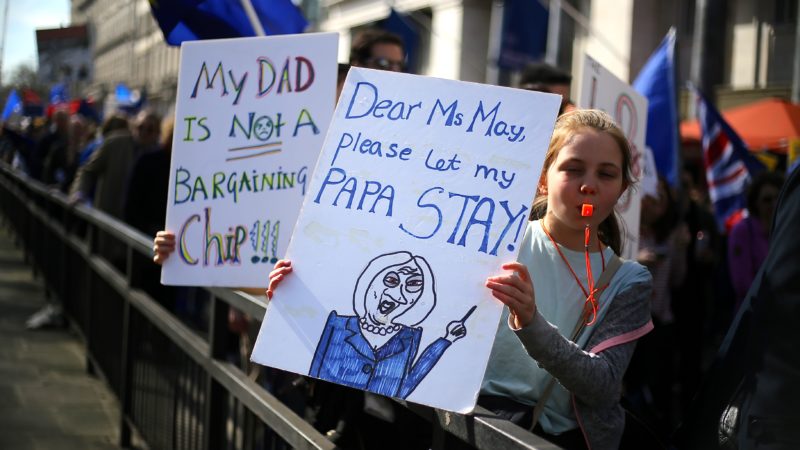The wording of Labour's proposed new Brexit policy is clear as mud - but many believe 'full participation' in the Single Market means ensuring free movement of workers.

An EU law expert has told Left Foot Forward that Labour’s proposed new Brexit policy ensuring ‘full participation’ in the Single Market is likely to necessitate free movement of workers.
Prof Nicola Countouris, Professor of Labour Law and European Law at University College London, told this site that Labour’s shift from previously to supporting ‘full access’ to the Single Market, to its proposed new wording of ‘full participation’ would likely require accepting free movement of people.
The wording change was a concession to pro-EU delegates after hours of negotiations on Sunday night.
The Single Market ensures the removal of barriers to trade such as tariffs and taxes on imports, but requires the ‘harmonisation’ of national rules at EU level – i.e. abiding by EU standards on goods and services.
Norway, Iceland and Lichetenstein, as members of the European Economic Area, have access to the Single Market without having to be a member of the EU. However, they have no vote on EU rules.
Two anti-Brexit sources told this site that Labour’s proposed new policy takes Labour closer to backing membership of the European Economic Area as a minimum.
Prof Countouris told LFF that ‘full participation’ would mean “we will have to participate with free movement of workers.”
The EU has in recent years tightened its free movement rules for non-EU members who are part of the Single Market.
For example, Swtizerland, while not technically member of the EEA is part of the Single Market. The country is required to accept free movement of workers, after apparently trying to wriggle out of its obligations.
“The UK will find it difficult to have opt outs [from Single Market rules]. The EU has been malleable to countries coming closer to the EU – not those going further away…The EU will want to preserve the indivisibility of the four freedoms,” Prof Countouris said.
For a time, Switzerland was excluded from Horizon 2020 – the EU’s framework programme funding research, technological development, and innovation – for not adequately allowing free movement of workers. The country also had to end its historic banking secrecy in return for full participation in the Single Market.
Labour’s proposed new Brexit policy is being voted on by delegates today, and commits Labour to pushing for a ‘People’s Vote’ on Brexit if there is no General Election, as well as voting down the Tories’ Brexit plans.
Pretty pleased that the Brexit motion before conference guarantees that Labour will seek “full participation in the single market” (movement from “access to…”) Just shows that a Labour-negotiated Brexit would put jobs, rights & NI first. #lab18
— Antonia Bance (@antoniabance) September 24, 2018
The Labour Campaign for Free Movement have welcomed the likely shift in language from Labour.
Ana Oppenheim, organiser for the Labour Campaign for Free Movement (LCFM) internal pressure group, said:
“If passed by conference, this motion represents a major first step, guaranteeing that our party will fight any attempt to strip millions of Britons and Europeans of their existing free movement rights.
“It will be a powerful springboard for our continuing campaign to extend the migration rights of both EU and non-EU migrants, and in the coming months we will continue to fight for policies including the further extension of free movement, the abolition of all detention centres, and an end to discriminatory attacks on access to the NHS and social security.”
Joshua Lovell, the LCFM supporter and Momentum activist who proposed migrant rights measures on behalf of his local party in the negotiations, said:
“The recent Migration Advisory Committee report showed that migration has little or no effect on wages and unemployment, and we know Theresa May attempted to suppress nine more reports proving the same.
“The unanimous agreement in the motion negotiations to identify the rich and powerful, not immigration, as the culprits behind the social crises we face, shows that we have conclusively put to bed the discredited Tory lies that seek to divide working people by birthplace.”
After Brexit, a Labour government may use its leverage gained in allowing freedom of movement in order to secure guarantees that its renationalisation plans will be accepted by the EU, Prof Countouris suggested.
While broadly possible even within the EU, “EU competition law might make some renationalisation more arduous,” the academic told LFF. Nationalising postal services may for example be difficult, but not taking ownership of railways.
“[A Labour government] could get concessions in exchange for free movement of workers,” he said.
He stressed that while Labour’s wording is unclear, “even Chequers is not all there. Everyone is in the dark.”
Labour may be more willing to accept freedom of movement after it announced plans for sectoral wage bargaining, which would set standard wages for all workers in each sector.
Josiah Mortimer is Editor of Left Foot Forward. Follow him on Twitter.
See also: ‘Halting Brexit isn’t some Remainer fantasy – it’s vital for the Corbyn project’
To reach hundreds of thousands of new readers we need to grow our donor base substantially.
That's why in 2024, we are seeking to generate 150 additional regular donors to support Left Foot Forward's work.
We still need another 117 people to donate to hit the target. You can help. Donate today.



